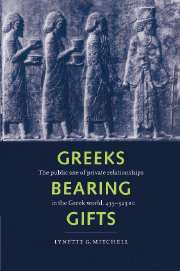Book contents
- Frontmatter
- Contents
- Preface
- Abbreviations
- 1 Philia
- 2 Philia and the polis
- 3 Philia and political activity
- 4 Magisterial appointments: Sparta
- 5 Magisterial appointments: Athens
- 6 Persia and the Greeks
- 7 Athenians and Thracians
- 8 Philip and the Greeks
- 9 Alexander
- 10 Friendship and ideology
- Appendix I Magistrates with connections
- Appendix II Notes on magistrates for the years 435–323 BC
- Bibliography
- Indexes
- Frontmatter
- Contents
- Preface
- Abbreviations
- 1 Philia
- 2 Philia and the polis
- 3 Philia and political activity
- 4 Magisterial appointments: Sparta
- 5 Magisterial appointments: Athens
- 6 Persia and the Greeks
- 7 Athenians and Thracians
- 8 Philip and the Greeks
- 9 Alexander
- 10 Friendship and ideology
- Appendix I Magistrates with connections
- Appendix II Notes on magistrates for the years 435–323 BC
- Bibliography
- Indexes
Summary
‘You acted very naturally,’ said he. He seemed thoughtful, and after a few moments added: ‘All the same, I don't think much harm would have come of accepting.’
‘No harm, of course. But we could not be put under an obligation.’
‘He is rather a peculiar man.’ Again he hesitated, and then said gently: ‘I think he would not take advantage of your acceptance, nor expect you to show gratitude … He has rooms he does not value, and he thinks you would value them. He no more thought of putting you under an obligation than he thought of being polite …’
E. M. Forster, A Room with a ViewPeople relate to each other in a variety of ways: father and daughter, consumer and producer, lovers, king and subjects, professional colleagues, fellow-employees, doctor and patient, bully and victim, just to give a few examples. All of these relationships are different from each other, and all are expressed differently. Furthermore, the differences in the kinds of relationships are both socially and culturally determined, and can even vary enormously within the same culture over relatively short periods of time.
In every society there are a number of relationships (although not all) between individuals which operate on the basis of exchange of one kind or another, and just as there are many kinds of relationship, there are also many kinds of exchange.
- Type
- Chapter
- Information
- Greeks Bearing GiftsThe Public Use of Private Relationships in the Greek World, 435–323 BC, pp. 1 - 21Publisher: Cambridge University PressPrint publication year: 1998



